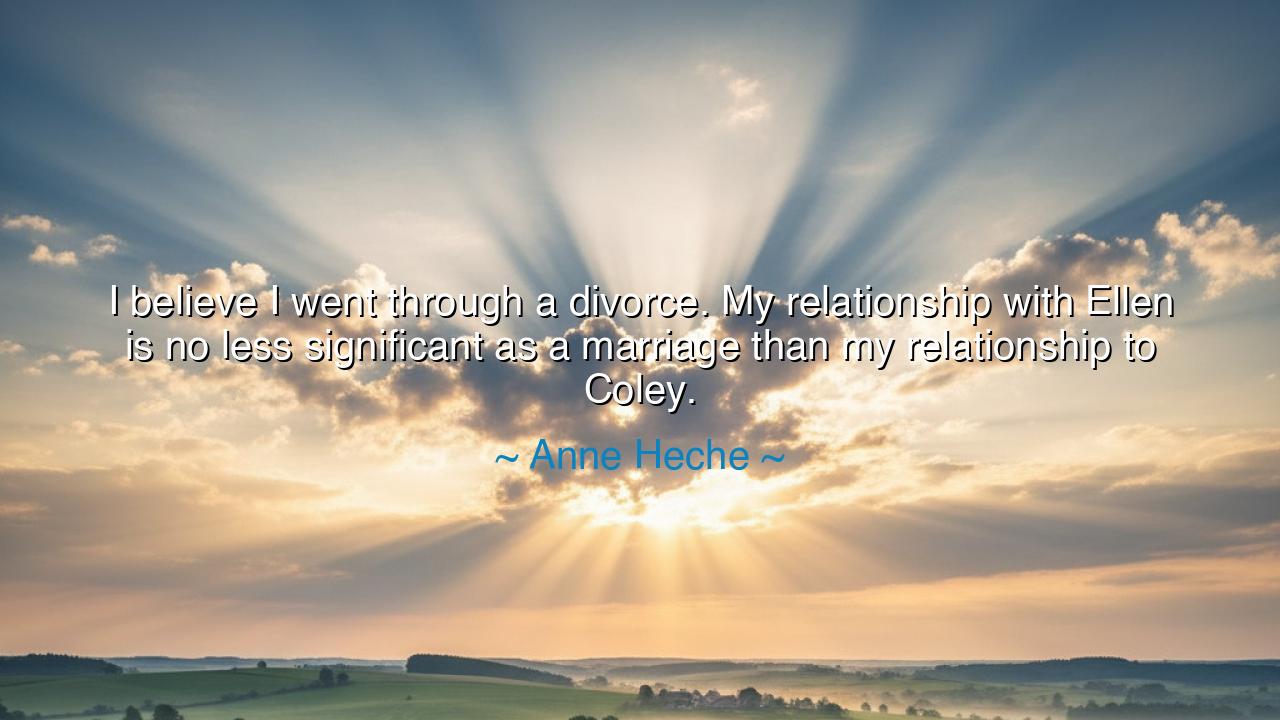
I believe I went through a divorce. My relationship with Ellen is
I believe I went through a divorce. My relationship with Ellen is no less significant as a marriage than my relationship to Coley.






When Anne Heche said, “I believe I went through a divorce. My relationship with Ellen is no less significant as a marriage than my relationship to Coley,” she was not simply reflecting on love, but on recognition — on what it means to have one’s heart honored equally, regardless of who one loves. Her words emerged from a time when same-sex relationships were still viewed as lesser in the eyes of law and culture, and through her voice spoke the ache of all who have loved deeply but been told their love was somehow less real. In those few words, Heche laid bare the truth that commitment and heartbreak do not bow to social definitions; that love, in its sincerity, transcends gender, legality, and convention.
The origin of this quote lies in the late 1990s, when Anne Heche — a Hollywood actress — entered a highly publicized relationship with Ellen DeGeneres, one of the first openly gay women in entertainment. Their union was groundbreaking, yet it drew enormous scrutiny from a society not yet ready to see two women love openly. After their separation, Heche compared that relationship to her marriage with Coley Laffoon, declaring that the end of her love with Ellen felt like a divorce. In doing so, she quietly challenged the world’s hypocrisy — that the emotional bonds of same-sex love are just as real, just as binding, and just as capable of devastation as those within marriage.
Her statement echoes the ancient truth that love is not defined by law but by sacrifice. Across centuries, poets, prophets, and philosophers have sought to name the power that binds two souls. In ancient Greece, Sappho wrote verses to women that celebrated a love divine, defying the conventions of her day. In imperial China, secret poems between women survived in whispers, though society erased their names. And in every age since, lovers have risen to proclaim what Heche so simply said — that the measure of a relationship lies not in who society blesses, but in the depth of the bond itself. She reminds us that the heart obeys no law but its own truth.
Heche’s courage lies not only in her words but in her vulnerability. To admit heartbreak is to confess that love mattered — that it demanded faith and left wounds. And to say that her relationship with Ellen was “no less significant” than her marriage is to demand equality of meaning — a revolutionary act in a time when same-sex unions were denied even the right to exist. Her grief became testimony: that when two people share devotion, laughter, struggle, and trust, it is marriage in spirit, whether the law recognizes it or not. Through pain, she became an unwitting philosopher of love’s equality.
Consider the story of Oscar Wilde, another artist who paid dearly for loving outside society’s bounds. His affair with Lord Alfred Douglas cost him his freedom, his health, and his career — yet in his letters from prison, he wrote that love, though it may lead to suffering, is the highest form of truth. Wilde and Heche, though separated by a century, both remind us that the human heart cannot be legislated. It is as free and as fragile as the wind, and to deny its freedom is to deny what is most divine in us.
The emotional force of Heche’s words lies in their universal resonance. Every person who has loved deeply and lost understands the feeling of divorce — not in the legal sense, but in the tearing apart of two intertwined souls. Her statement is a plea for empathy: that love between women, between men, between any two souls, is as real, as joyous, and as painful as any traditional marriage. She calls for a world that measures love not by form but by faithfulness — not by approval, but by sincerity.
Let this be the lesson: to love truthfully is to live courageously. Heche’s words remind us that no authority, no culture, no tradition has the right to define the worth of another’s love. What sanctifies love is not ceremony, but devotion; not legality, but honesty of heart. Therefore, let every generation remember this wisdom — that love, when genuine, carries its own sanctity, and that the measure of a union lies in the strength of its compassion, not the stamp of society’s approval. For as long as we honor love in all its forms, we honor the divine spark that dwells within us all — the spark that says simply: to love is to be human, and to be human is to deserve dignity.






AAdministratorAdministrator
Welcome, honored guests. Please leave a comment, we will respond soon